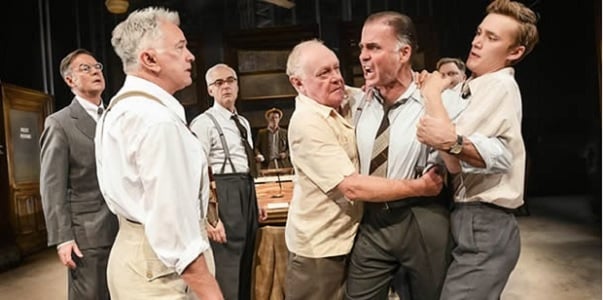
Twelve Angry Men
Garrick Theatre
November 12 2013
Reginald Rose knew how to structure a piece of drama and knew how to write crisp, spare dialogue which was real and resonant, which advanced or developed character, was funny or emphatic (or both) and which effortlessly served the play. His most famous work, rightly so, is Twelve Angry Men, currently enjoying a revival at the Garrick Theatre in a production directed by Christopher Haydon.
The play concerns the deliberations of an all male jury in a murder trial – when the play starts 11 jurors think the accused is guilty, by the end of the play a Not Guilty verdict is returned. It always sounds like the play is about the righteousness of justice, but it it is not: it is about normal people doing abnormal things, about the role everyday people have to play in a good society. And it is a serious and complete examination of the way prejudice can destroy lives.
In many ways, the play is old fashioned, but that is a strength rather than a weakness. It can soar when the actors are sufficiently clever (and subtle) to get their characters exactly right (none is like another), representing a diverse cross-section of society.
In these times, it is difficult to know why the play is not presented without an interval; certainly the tension would permit such a performance and the length would be well under two hours.
The play needs hardly anything in the way of a set, but here the production is well served by Michael Pavelka’s clever set (complete with revolving juror table which one never actually sees move but which regularly does) and Mark Howland’s clever lighting.
In order to work properly, though, the play needs twelve remarkable actors, none of whom needs to feel the need to be the star. Each character has his moment in the sun, and the play works best when that is allowed to happen, when the drama plays out like the symphony that it really is, reaching crescendos and then falling away, re-grouping, peaking again and again as different jurors/instruments take the foreground.
But there are five key jurors (3, 4, 8, 9 and 10) on whose shoulders the central passages depend.
Martin Shaw is a terrific 8, the juror who believes in Reasonable Doubt and slowly changes the opinions of the others. Robert Vaughn is fine as the old man, 9, but he reads many lines (from a script clearly secreted on the table) and is often seen onstage rehearsing lines he is yet to say. However, when he is in a moment he is on top of, he is arresting.
Jeff Fahey (3, the wounded father with a resentment of youth) and Miles Richardson (10, the racist git) are not up to the overall challenge of their hideous characters and, sadly, key dramatic moments are lost. This might be more about directorial choices than acting chops, because both men seem to be capable of truly delivering the goods. But the true tension that each of those two jurors can separately cause is never attained here.
This evening, Luke Shaw went on as 4 and he was less than compelling in every way: there is a steely underbelly and a sureness of conviction to 4 that was completely absent here. 4 is prejudiced as much as 10 is, but just about his own superiority. It is a key plank of the drama and without it, much is lost.
Martin Turner (11, the immigrant) and Nick Moran (7, the Baseball lover) are both quite excellent in their characterisations, although both need to spend more time on accents and the rhythms of their speeches.
Robert Blythe (6), Edward Franklin (5) and Jon Carver (the Understudy for the Foreman) all acquit themselves admirably; the others not so much.
It’s a worthwhile night at the theatre, quite engrossing, but it does not reach the level of excitement it ought. And that does not seem to be about the cast. Rather, it is about lacklustre direction which puts more emphasis on movement than the gifts the dialogue and plot turns provide.
